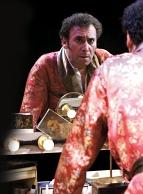Kean
It's not quite clear exactly when the great actor, Edmund Kean, was born. Some of his early childhood was rather shrouded in mystery, and the man himself had a tendency to reinvent his life story when the fancy took him. But one thing we can be certain of is that, from 1814, his acting ability drove audiences into frenzied amazement. After joining the Drury Lane Theatre (when it was all-but broke) he made his debut as Shylock in the Merchant of Venice, and then went on to tackle the great Shakespearian tragedies: Richard III, Othello, Hamlet, Macbeth and King Lear. Great though his acting talents may have been, Kean was not exactly the epitome of the dashing, romantic male lead. He was rather short, had a gravelly voice, and had a love of drinking to excess and womanising.
'Kean' doesn't try to take us through the great actor's biography. Rather, we get a glimpse of the kind of life he led, and the admiration he garnered (or didn't, as the case may be) by seeing a short snapshot of his life while at the height of his acting powers. The play was written by Jean Paul Sartre - better known to most of us as the great twentieth century philosopher. Sartre wrote the play based on another play by Alexander Dumas (the elder) entitled Kean ou Désordre et génie.
The plot of Sartre's play revolves around Kean's interactions with the 'toffs', among them the Prince of Wales, and notables such as the Danish Ambassador and his elegant and glamorous wife, Elena, who Kean wants as his mistress. But the Prince of Wales wants Elena for himself and a kind of tug-of-love ensues with the Prince trying to bribe Kean. While all this is going on, Kean is being harassed by a would-be actress which adds to the complexity of his already-complex lifestyle.
Somehow, it always seems rather contrived and a little uncomfortable watching actors, playing actors. So it's even stranger to discover that both Sartre and Dumas wrote their plays at the request of particular, noteworthy actors. And the actor playing the actor in this version of Sartre's play is none other than knight of the realm, Sir Anthony Sher - with many a fine performance to his credit, especially in the Shakespearian department.
Sher's performance is certainly impressive and imposing. He strives to present an authentic portrait of Kean complete with gravelly-sounding vocalisation. And we're treated to a glimpse of Sher, playing Kean, playing Richard III. However, though Sher's performance is flawless in almost every respect, he didn't quite convince me that he was a truly inspirational actor - someone with such extraordinary acting talents that would have audiences queuing down the street to get into the theatre.
Bear in mind that this is a play written in the 1950s about an eminent actor of the regency period - around 1815-20. But here, designer Mark Thompson and director, Adrian Noble, have set the piece in what could be almost any time between the 1920s to the late 1940s. This leads to something of a false impression, because the acting styles of the Regency period were rather different from those of the mid-twentieth century. It all seems rather confusing, and I'm not sure I understood what Adrian Noble's production, or Sartre's play was really trying to convey.
Interestingly, Kean's life ended with a distinct whimper, rather than the roar one might have expected. In 1833, he collapsed during a performance of Othello (with his son playing Iago) and died a couple of months later.
(Peter Brown)
What the popular press had to say.....
NICHOLAS DE JONGH for THE EVENING STANDARD says, "Grimly unamusing...It is an evening of unalloyed displeasure." MICHAEL BILLINGTON for THE GUARDIAN says, "If the play works at all, it is as a colourful period charade. But, by taking its ideas seriously, Noble simply exposes their banality." CHARLES SPENCER for THE DAILY TELEGRAPH says, "A ghastly evening of tedium and pretentiousness." BENEDICT NIGHTINGALE for THE TIMES says, "[Antony Sher] wasn't as forcefully magnetic as I expected." PAUL TAYLOR for THE INDEPENDENT says, "Entertaining production."
External links to full reviews from popular press
The Guardian
The Independent
Daily Telegraph
The Times
Originally published on
